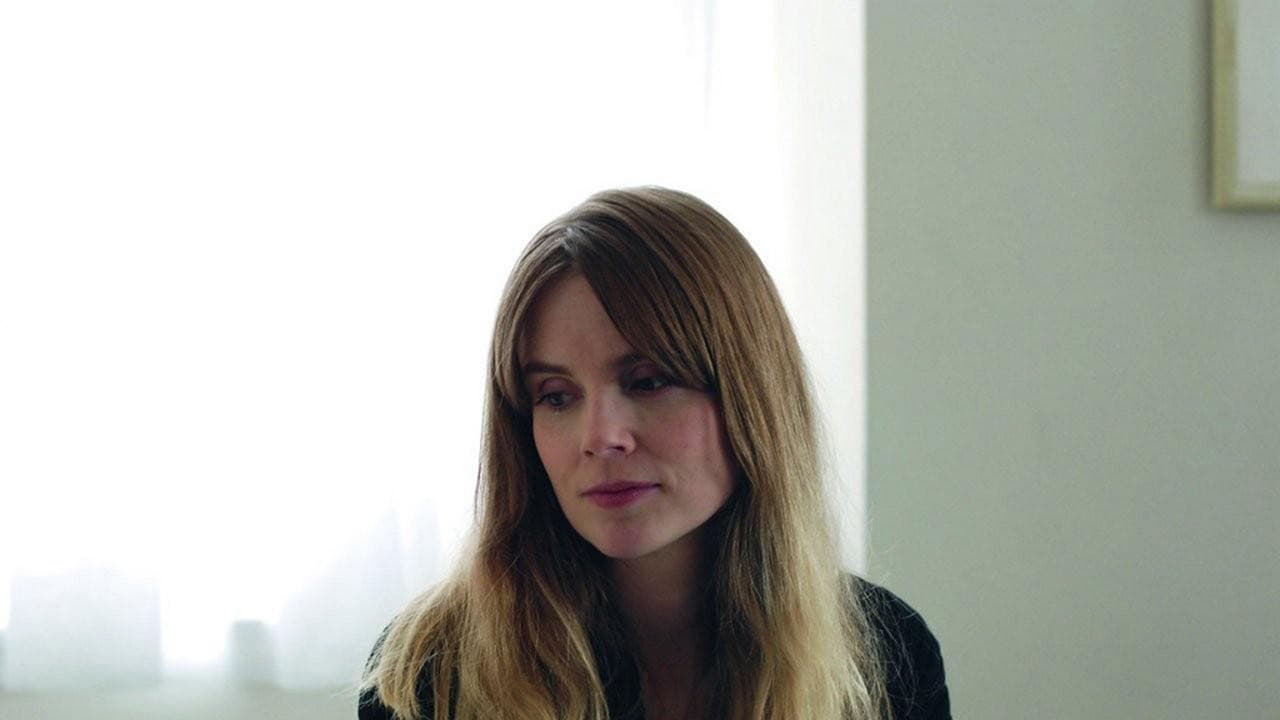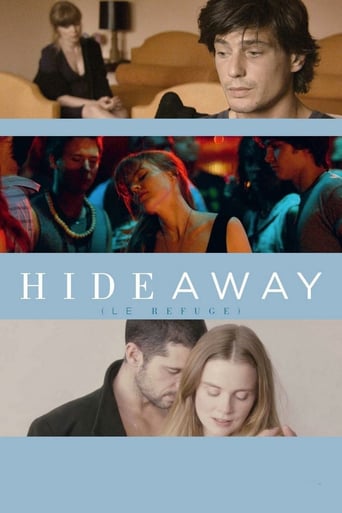

Louis and Mousse are junkies. At the start of this tale, they are visited by a supplier, who brings them six grams of heroine that proves fatal.The heroin is lethal and Louis overdoses. Mousse, oblivious of his death, is found in bed by his mother, a rich lady who is renting the apartment, not suspecting her son is dead. Mousse is taken to a hospital to be detoxed, and in addition to that problem, it is found she is pregnant.At the funeral, Mousee, who has been released by then, goes back to the house, where her presence is not wanted. Paul, a brother of the dead young man, is the only one that shows any compassion toward Mousse. The mother of Louis has a serious talk with the girl. She confronts her on the pregnancy, something that Mousse assures her it belongs to Louis. The mother feels it is better if she aborts because of the dangers of passing the addiction to the baby, something that Mousse disregards, having a different idea of how to handle her imminent future.Mousse goes into a hideaway in a secluded part near a beach. Paul, on his way to Spain, stops at the house to spend a few days with Mousse. Paul, who is gay, finds a nice young man, Serge, who works in the area. The house where Mousse is staying belongs to a man who was her lover when she was sixteen years old. Now she takes her time to meditate on her future while living with limited funds and dependent on the methadone she must take in order to stay off heroine.Paul sees in Mousse a kindred spirit. He tries to get her to go out, something she has not done, preferring to stay home, away from people. Paul finally convinces her to go to the beach with him. There she is not shy in showing her pregnancy to anyone who looks. Even though Mousse knows what Paul is like, she regards him as an extension of her dead lover. One day, at an outdoor cafe, Mousse meets a man who has an interesting proposal for her. How about letting him take her to his room overlooking the water and make love to her. The incident goes badly when Mousse decides to sit with the man while he caresses her, but no actual intercourse.Like some of his previous films, director Francois Ozon sets most of "Hideway" on a beach. This film is not quite as intense as "Under the Sand", "See the Sea", or even "Swimming Pool", but it has lovely reflective moments in which Mousse must deal with her present reality. Having decided to have the child, she feels that little baby will be part of what she had with Louis, whom she sadly misses. The hideaway of the title refers probably to the reflection Mousse is experiencing, away from her chaotic life with Louis in Paris. The serenity of the location, plus her rapport with Paul, contribute to her mental well being. The only thing that does not ring true is the fact that Mousse is released from the hospital in no time, when in reality she needed to stay if she was to be cured of her drug addiction.Isabelle Carre makes a wonderful Mousse. She was pregnant at the time the film was made. Ms. Carre is the best thing in the film. Louis-Ronan Choisy is quite effective as Paul. The actor was making his film debut in this film and he is also credited with the incidental music heard in the picture. Melville Poupaud is seen briefly as Louis. Marie Riviere shows up briefly.
... View MoreBy the time this movie rose to the top of my queue I had totally forgotten how it ever got on my queue and had no idea what it was about. I think this turned out to be fortuitous, since from the very beginning you never know quite where the story is going. Not wanting to spoil the effect for those who come to this cold as I did, I will only say that the main character, name Mousse, is a woman of shifting moods and a woman who remains somewhat mysterious. There are men in her life, but the relationships are not predictable.The filming is interesting. A lot of the movie takes place in the night and I found myself turning up the brightness on my TV to make out some of the scenes. Also, a lot of the scenes are back-lit, or are taken from a darkened room with a doorway or window opening onto bright sunlight. On the other hand there are many scenes filmed outdoors in brilliant sunlight. I could never figure out if this was strictly a director's stylistic technique, or whether the contrasts in light and dark were to reflect Mousse's mood shifts.Some may find the pacing rather too measured, but I found this film to be a satisfying character study. I came away with a renewed appreciation for the near infinite variety of human experiences.
... View MoreIt's quite difficult to summarise what Le Refuge is about, there is a plot, it's linear, and quite simple, but there's nothing really generic in content, and it's not particularly dramatic either. Couldn't really call it anything other than an "emotion painting", beautifully shot, and well performed. The characters in the film are rather unlikeable, Mousse (Isabelle Carré) is a charismatic kidult heroin addict with a sharp tongue and propensity to sexual jealousy, unflappable Paul who somehow gets entangled with Mousse, has no sympathy with his brother's pained life and subsequent death. The background of high affluence that these two come from seems to be a seething psychological vipers nest from a wet dream of Freud.The story regards Mousse who manages to survive her lover when they both tuck into a bad batch of heroin. She is pregnant and now on methadone, taking refuge at the coast in an acquaintance's deserted property. The extremely handsome and gay Paul (the brother of her lover) turns up, but is full of sangfroid to the gills and becomes an object of unattainable lust for Mousse.One might say that the film is an unhaloed look at pregnancy. Mousse is fine with drinking alcohol and methadone for two, the film also looks at the erotic potential of the pregnant woman, as Mousse is propositioned by various men, and throughout she is quite unsentimental, as if she were a paid surrogate. I think that the camera-eye is not altogether disapproving, there is perhaps a feeling that in modern times preparations for a baby are preparations as if for the visit of a little emperor, with all the concomitant Freudian backlash.It feels a little dirty sometimes that there are questions that only the viewer of the film knows the answer to, as opposed to the characters. The characters are left to wonder why, for example, did Louis die and Mousse survive? I think as well that there are things left to the viewer's imagination, for example the story of Louis and Paul's parents, which begs a whole film in itself; there's a kind of pendulosity to the suggestions there that really make the film feel like a masterpiece.Visually I think there are some nice touches, this is the first time Ozon has filmed in digital, and he and the DP were playing around here. There's a psychological resonance when Mousse is at the beach on a bright summer day and a scene is played out with grafittoed breakwaters in the background that scream hazard as the water smashes into them. There's also a lovely shot at the beginning where a coruscating river reflects off a glass-fronted building.It's ultimately an extremely winsome tale of fallible characters. I think the fallibility is extremely well portrayed, these characters are fallible just like pretty much everyone who'll be watching the film. So I give the film a lot of points for humanity, as well as, by the way, for not having an ounce of fat at 88 minutes.For more excellent acting from Isabelle Carré in a "bad woman" role, you could do worse than watch Anna M. A note as well that this film could as seen a return to the aesthetics of Ozon's 52 minute thriller Regarde la mer, also about a disquieting movie starring a mother figure who frequents the French beaches.
... View MoreA film of a modest budget, a film made in the sunny Pays Basque and a film which captures a real pregnancy. As a matter of fact, The Refuge is "born" of this idea to film a pregnancy, and this movie benefits this particular occasion. But let's say it is not a typical idyllic portrayal of a pregnancy or of a pregnant woman. The only thing that may be idyllic, is the sun of the south of Europe. Otherwise, this is a capture of troubled lives and troubled personalities. The start of The Refuge is marked by a death by a drug overdose. Useful to say that the bunch of takes in beginning does not transmit even little of the richness of the future images of film. But who knows, maybe the cliché full drug taking scenes are there to underline the contrast. Anyways, the decease of the character of Louis, puts an ending to a love story - a very brief moment. Nevertheless, there is another story on the way and the principal figure of this film, Mousse, miraculously alive, carries it in her belly. And here begins the refuge where two characters, Paul and Mousse, try to figure out their lives. Paradoxically, these two lives are not so related as much as one can probably think, as they are put so close. Passing to the refuge in Basque Country, Ozon makes sure that the spectator draws a clear line in his mind by the change of tonalities – grim and gray for Paris and pastel and sunny for the south. Despite the posh ambiances of Paris surroundings and idyllic summer of southern Europe, the images speak generally of troubled lives. They portray a woman, struggling with the sudden solitude and a man, trying to find where exactly he belongs. The director puts on the screen a pregnancy that troubles the spectator more than the mother. Quite an ironic manipulation with those in front of screen – they experience the turbulence knowing that the heroine is still taking methadone and does not refuse alcohol or a night in club with music roaring loudly. But truly, it's all not about this. She is well aware of her pregnancy, but this is a different kind of pregnancy. It is not for the sake of it, it is for the sake of keeping the life. The big belly evokes the presence of Louis, who is gone and the presence of the baby, who hasn't yet arrived. It's nice to see, that director has found out, that pregnancy can be be showed as an instrument of portrayal or a link among other elements of the film. For example, it allows to grasp the personality of Mousse. It is like some sort of mourning which passes very silently, without hysterical and loud scenes. Like the way she is – very introvert and calm, keeping all the troubles inside; nevertheless the situation permits to see her desire for independence and stubborn nature. In addition, who would have thought, that giving different sexual orientations to the principal characters, permits so precisely to limit any kind of romance, even placing both in one, relatively isolated space and time. And even if Ozon lets happen something, it still is for the sake of the story, not for the comfort of spectators' expectations. Also, it has to be admitted, that Isabelle Carré looks beautiful and plays admirably the role of Mousse, in a way, living through two stories of one pregnancy.
... View More